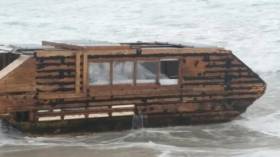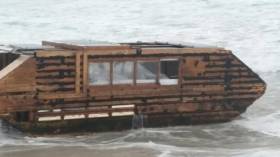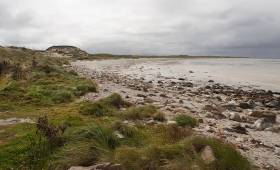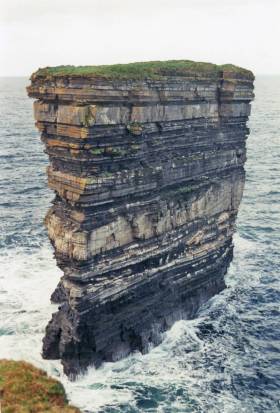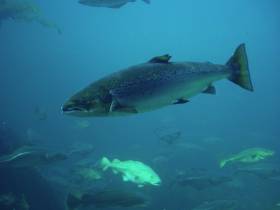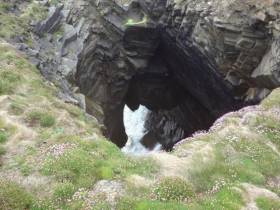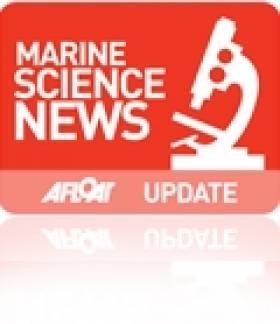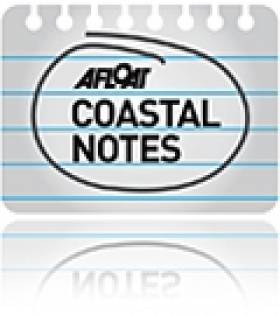Displaying items by tag: Mayo
Beached Houseboat Could Be Mayo Tourist Attraction
#Houseboat - The Canadian houseboat that washed up on the northwest Mayo coast earlier this month could be repurposed as a tourist attraction for the region.
As previously reported on Afloat.ie, the vessel drifted across the Atlantic from Newfoundland to Cross Beach on the Mullet Peninsula in a matter of weeks, some time after it was apparently donated to homeless youths by its owner Rick Small.
The local coastguard unit in Belmullet says it has so far been unsuccessful in its attempts to contact Small, in which case the vessel technically counts as a shipwreck.
And according to CBC News, it could eventually be repurposed as a tourism draw for the area, which lies on the Wild Atlantic Way.
Indeed, a local group known as the Men’s Shed has already been consulted about ideas for restoring the houseboat.
Houseboat Found On Mayo Beach Crossed Atlantic From Canada
#Houseboat - Just days after reports of fatty balls on Mayo beaches comes word of a houseboat that’s washed up on the county's northwest coast after crossing the Atlantic from Canada.
RTÉ News reports that the houseboat was set to be removed today (Monday 14 November) by Mayo County Council after beaching on Cross Beach on the Mullet Peninsula at the weekend.
The vessel, which may have been docked in Newfoundland as recently as late September, was apparently donated to ‘a homeless youth’ by its owner Rick Small – who gained some celebrity in Canada two years ago for riding a solar-powered tricycle across the country.
RTÉ News has more on the story HERE.
Warning Over ‘Fat Balls’ On Mayo Beaches
#CoastalNotes - Dog walkers have been warned to keep their pets away from smelly, fatty globules that have washed up on the North Mayo coast in recent weeks, as The Irish Times reports.
One woman on the Mullet Peninsula says her dog became ill after eating part of one of the ball-like fatty deposits, which could be the waste products of materials used to clean up oil spills at sea — or possibly congealed palm oil used for cooking and released legally by ocean-going vessels.
The Irish Times has much more on the story HERE.
Sea Stack Scaled By Adventurous Climbers For First Time In 25 Years
#SeaStack - A famous sea stack off the Co Mayo coast has been climbed for the first time in more than 25 years, as Independent.ie Travel reports.
At the end of August, Iain Miller and his climbing partner Paulina Kaniszewska reached the top of Dún Briste, off Downpatrick Head, in what was the third attempt by the former to summit the 50m rock.
One of the more breathtaking spots along the Wild Atlantic Way, it's also considered a particularly dangerous climb that should only be attempted by experts.
But for Miller, the rewards for scaling the summit of a place that has seen fewer visitors on record than men on the moon were more than he could put into words.
Independent.ie Travel has more on the story HERE.
Mayo Man Convicted Over Unlawfully Caught Salmon
#Angling - A Mayo man was charged with possession of eight unlawfully caught salmon at Lacken Pier on 22 July 2015 at a sitting of Ballina District Court earlier this month.
Stephen Rooney of Ballina, Co Mayo pleaded guilty to the charge and was fined €160 with costs amounting to €250.
Judge John Lindsay heard evidence that fishery officers had observed a car on Lacken Pier on the night of 21st July 2015. The officers noticed liquid oozing from the underside of the car, which they suspected to be blood and mucous from fish.
The car was kept under observation overnight, and in the morning several attempts were made to contact Rooney, its owner. The car was searched when he failed to respond, and eight fresh net-marked salmon and an undersized lobster were found in the boot.
Commenting on the case, Inland Fisheries Ireland (IFI) chief executive Dr Ciaran Byrne said: “Netting of salmon in the open sea has been illegal since 2007 as it is indiscriminate and takes fish destined for different river systems, some of which have depleted salmon stocks and are under severe pressure.
“Salmon angling is extremely valuable to the tourism industry in North Mayo and provides revenue, employment to local communities, and recreation to thousands of anglers both local and visiting from abroad and other parts of Ireland. Inland Fisheries Ireland will continue to work to protect this resource for the good of the community.”
Elsewhere, at sitting of Galway District Court on 7 June, Judge John King convicted two Galway fishermen of the non-payment of fines issued by fishery officers, and ordered a third man to pay a donation on the same charge.
Leslie Sammon, with an address at Ballinasloe, Co Galway, was before the court over non-payment of a fixed penalty notice of €150 for failing to complete a logbook upon taking a salmon from the Clare River, Claregalway last July. He was ordered to pay €200 to the RNLI by Judge King, who agreed to a donation in lieu of a conviction.
Alekseys Minkevics, with an address at Knocknacarra, Co Galway, was also summonsed in connection with an incident on the Clare River on 30 September last.
Minkevics, who failed to appear in court, had been observed fishing with live perch, in breach of fisheries legislation, and failed to pay the fine within the required timeframe.
Judge King convicted Minkevics and ordered him to pay €300, as well as €600 in costs. His fishing equipment was also ordered to be forfeited.
Viktor Buss, with an address at Headford Road, Galway was charged with a breach of a coarse fish byelaw on 5 October when he was found in possession of 32 coarse fish, eight times the legal limit. He was issued with a fixed penalty notice of €150 which he failed to pay.
Judge King recorded a conviction against Buss, who did not appear in court, and issued a fine of €300 with costs amounting to €600. His fishing equipment was also forfeited.
IFI has a confidential hotline number to enable members of the general public to report incidents - 1890 34 74 24 or 1890 FISH 24. This phone line is designed to encourage the reporting of incidents of illegal fishing, water pollution and invasive species.
Coastguard Cliff Team Recovers Body From Mayo Blowhole
#Coastguard - Coastguard teams from Achill and Ballyglass were involved in the recovery of the body of a young man from a popular tourism spot on the Mayo coast, as Independent.ie reports.
Achill Coast Guard's cliff rescue unit were called into action to recover the suspected faller from the 65ft blowhole at Dun na mBó after reports of a missing person in the area.
A spokesperson for Achill Coast Guard described the almost five-hour operation as "extremely dangerous, challenging and technically difficult" as the casualty was located in a cave within the blowhole, with sea water rushing in from the base.
Navy Joins Search For Missing Mayo Fisherman
#Missing - Naval Service vessels have joined the search for a fisherman missing off Mayo since last Friday 11 September.
As The Irish Times reports, 23-year-old Daniel Doherty is thought to have got into difficulty while baiting lobster pots on his boat Carra Rose off Belmullet.
The boat was located on the beach at Benwee Head, as previously reported on Afloat.ie, but there has been no other trace of Doherty since then.
Earlier today it was reported that both Ballyglass RNLI lifeboats remain involved in the multi-agency search for the lobsterman.
Search For Missing Lobsterman Off Mayo Coast
#Missing - Independent.ie reports on an ongoing search for a lobsterman feared missing off the Mayo coast since yesterday evening (Friday 11 September).
A fishing vessel was spotted on the beach at Benwee Head close to where the lone fisherman was thought to be working off Belmullet, but there was no sign of its occupant.
Searching was set to resume this morning with local lifeboats and coastguard teams includinng Shannon's Irish Coasrt Guard helicopter Rescue 115 on callout.
#warmlkake – A lake in county Mayo is among a number of lakes around the world that are 'warming' and Irish Marine Scientists are part of a global research project examining the trend.
Data for Lough Feeagh, situated in the Burrishoole catchment in Co. Mayo, forms part of the data, and is one of a small number of lakes worldwide for which long-term temperature data are available.
A temperature recorder on Lough Feeagh was originally installed in 1960, when the Salmon Research Trust of Ireland began investigations into the movement of salmon, trout and eel through the catchment.
The magnitude and uniformity of the worldwide trend remains unclear but to facilitate research on this topic, a global database of summer temperatures for 291 lakes from 1859-2009 has been compiled, complemented by data on local climatic drivers and lake geomorphology.
The paper describing lakes as sentinels of climate change is published in the Journal of Scientific Data, by Nature (http://www.nature.com/sdata/) on the 17th March 2015. Dr Elvira de Eyto, Marine Institute and co author on the paper along with Marine Institute scientists are part of the Global Lake Temperature Collaboration (GLTC), an international group assembled to provide increased access to global lake temperature records.
The GLTC project recognised that a new global database of lake surface temperatures was needed, including not only satellite data, but also "on the ground" measurements from in situ data collection programs. Since its
inception in 2010, the GLTC initiative has grown to a database of 291 lakes and reservoirs worldwide, providing summer-mean lake surface temperatures from 1985-2009, and roughly doubling the amount of data previously available from satellites alone. This new dataset represents the first publicly available global compilation of in situ and satellite-based lake surface temperature data. The GLTC database also provides information on climatic drivers (air temperature, solar radiation, cloud cover), as well as geomorphometric characteristics that may affect lake temperature (latitude, longitude, elevation, lake surface area, maximum depth, mean depth, volume).
This unique, global dataset will offer an invaluable baseline perspective on lake thermal conditions for ongoing and future studies of environmental change. The Marine Institute continues this work, and maintains an extensive environmental monitoring programme in the catchment which is used to record climate and land use changes that may impact fish stocks.
Mayo Fishermen Slate State Over Corrib Pipeline Damage
#Corrib - Mayo fishermen have criticised the State's response to the damaged Corrib Gas Field pipe, claiming that no Environmental Protection Agency (EPA) officials had yet been to the site, as The Irish Times reports.
Last Friday news emerged that a section of the outflow pipe from the controversial gas project had been dislodged from the seabed after it was spotted by local fishermen on the surface of Broadhaven Bay.
Recent stormy weather conditions in western coastal areas have been blamed for the damage, with the EPA quickly moving to quell any pollution concerns as the pipe was carrying "mostly rainwater".
However, the Erris Inshore Fishermen's Association – which withdrew co-operation with Shell over the North Mayo gas facility in 2011 – said yesterday (Monday 16 March) that the EPA had not sent its own officials to investigate the incident.
“This is what we fought against, and we are so lucky that there were no pollutants in the pipe,” said fisherman Pat O'Donnell, who was jailed for offences relating to protests against the gas scheme.
In response, the EPA stated that it did not "consider it necessary to send an inspector to view the pipe at this time".
The Irish Times has more on the story HERE.


























